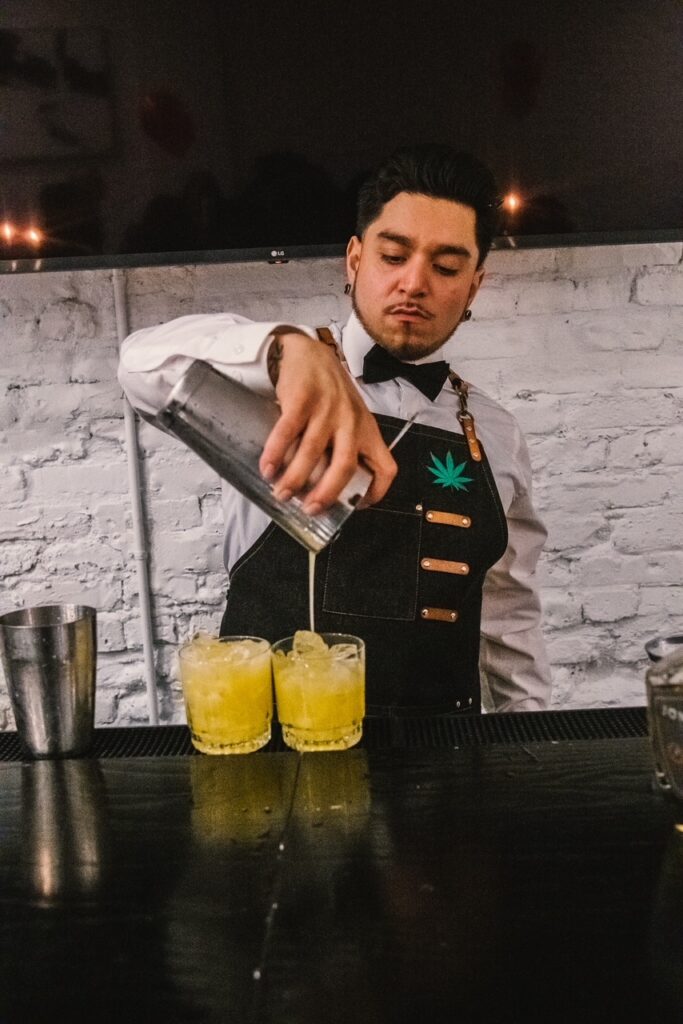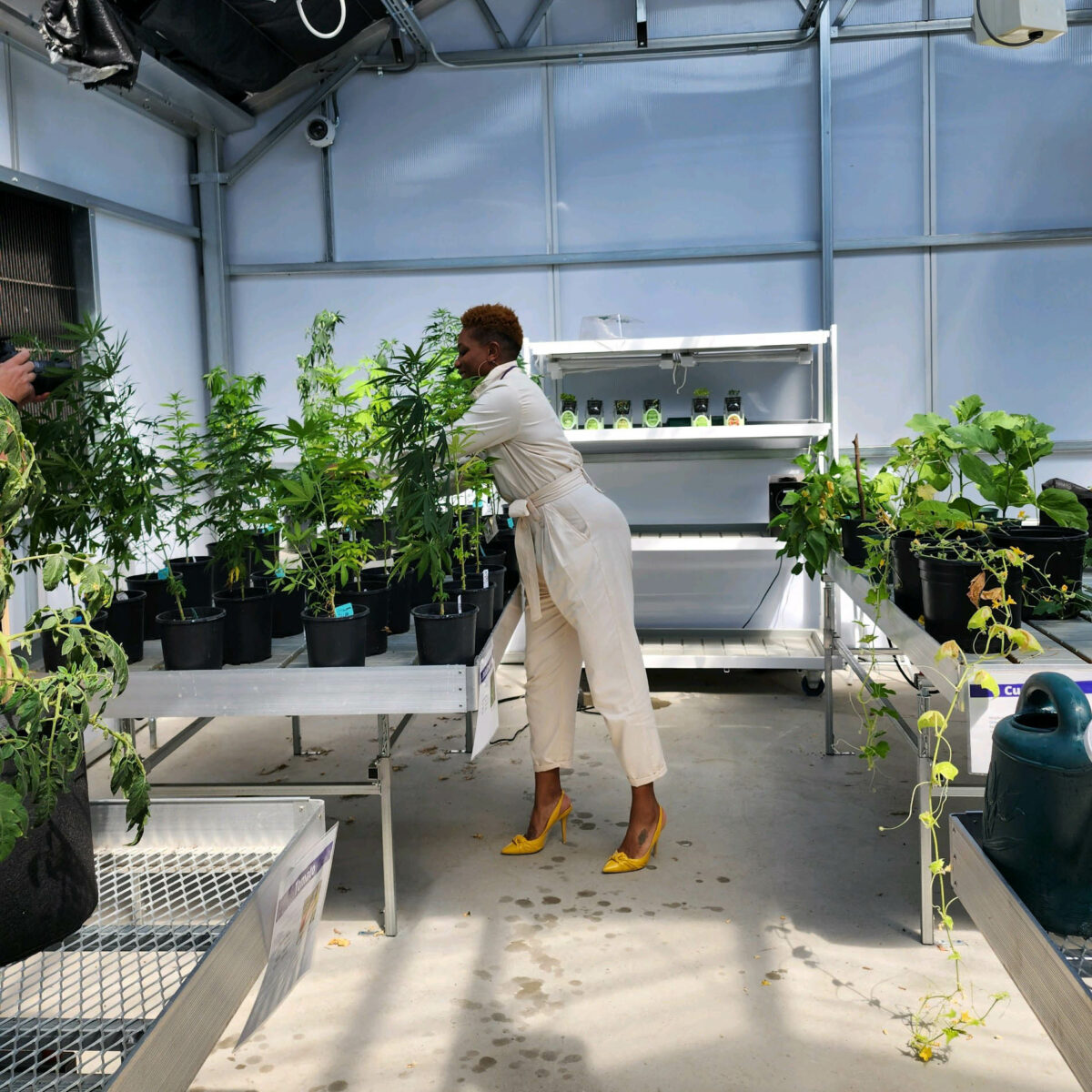This past April 20 was a holiday for many in Illinois. Dispensaries across the state promoted giveaways, raffles, and special cannabis product deals in commemoration of the unofficial cannabis holiday. Yet there were people in the cannabis industry who have had to find other ways to promote their business because of long standing inequities in who gets to legally profit from the plant.
Illinois lawmakers promised that the state’s legalization of cannabis would be the “most equity-centric” law in the nation. HB1438, which legalized cannabis in January 2020, was signed alongside criminal justice reform advocates and a major component was to promote “equity and invest[ments] in the communities that suffered through the war on drugs.” But the plant’s legalization more than three years ago has not led to substantial gains for the Black and Brown communities most affected by its criminalization.
Data from the 2022 Illinois Cannabis Market Diversity Report conducted by the Illinois Cannabis Regulation Oversight Officer (CROO), showed that eighty-eight percent of dispensary majority owners were white. The same CROO study reports that less than one percent of the cannabis ownership and workforce was formerly incarcerated.
For Brighton Park resident Carlos Ramos, waiting by the sidelines for an opportunity to be part of the growing industry was not an option. “The cannabis industry or culture is dominated by these MSOs, these multi state operators, these huge corporations that are really just in pursuit of profits off of this plant,” said the thirty-four-year-old. “The cannabis industry doesn’t look like me, it doesn’t represent me or reflect me.”
MSOs, or multi-state operators, are large cannabis corporations, such as Cresco Labs, Curaleaf, and Verano Holdings, that have the infrastructure to expand as cannabis continues to be legalized in other states. MSOs are often described with the mission to “capitalize on new markets by extending their opportunities” and “unlocking revenue.”
Ramos, who had previously been convicted of a felony for cannabis distribution, found an opportunity in the beverage industry after graduating from his bachelor degree. When COVID-19 hit, he then decided to combine his mixology knowledge with his passion for cannabis into Up Elevated Cocktails, a mobile cannabis cocktail bar that launched in August of 2020.

“I’m trying to build my own kind of legacy and work alongside people that have a care for the plant and have a care for people and community and trying to restore the harms done by the war on drugs,” said Ramos.
One component of Illinois’s equity-centric approach to legalizing cannabis was the development of the adult-use Cannabis Social Equity Program, which carved out an application process for social equity dispensary licenses. These licenses are awarded to people that “have lived in a Disproportionately Impacted Area,” have been arrested or convicted of a cannabis-related offense and or have a spouse, child or parent that’s been arrested/convicted of such offense. Criteria does not include gender, race, age or sexual orientation specifications.
There were problems with the approach from the beginning, such as allowing established medical marijuana dispensaries to immediately apply for adult-use retail licenses as well as a second retail location regardless of whether they were a social equity applicant. Successful applicants also had 180 days to meet state requirements and open up shop, which posed problems for many applicants who had limited access to capital and after lawsuits and delays in the program led to partners and investors pulling out.
Media outlets have also reported on the hurdles social equity applicants face in obtaining licenses, like tens of thousands in fees and legal help, and administrative errors leading to denied applications.
It took Alejandro Hernandez over two years of applying for budtender positions—dispensary staffers that have knowledge on cannabis products and steer customers in the direction of their pallet—to finally land an interview. In the meantime, Hernandez wrote on cannabis, with bylines in the Chicago Reader, and regularly blogs strain reviews and cannabis lifestyle content for Black Hippy Farms.
Hernandez says that despite cannabis consumers being diverse, the industry has yet to reflect the same. “People don’t really realize that if you’re just a fly on the wall at a dispensary, anything like that, you would literally see any type of person walk in,” said Hernandez, describing the range of cannabis consumers.
Hernandez went through three rounds of interviews with Grasshopper Club dispensary in Logan Square before getting the job. He believes that he got this far because it’s a Black-owned dispensary and part of its mission is “to create a more diverse ecosystem in the industry.” This is the kind of intentionality that Hernandez and other cannabis activists advocate for in the industry, and that he says is missing from MSOs.
Cannabis social equity programs were developed to avoid market dominance, but the big players have multiple advantages over small businesses and social equity applicants. The Reader reported that MSO Cresco Labs, for example, was allowed to submit multiple applications for licenses. The Cannabis Business Association of Illinois, which includes MSOs, lobbied against a bill that would allow craft cannabis growers more canopy space, something that craft growers have said is necessary to make their businesses profitable.
While individuals like Hernandez and Ramos are forging their own ways into the cannabis industry, agencies like the CROO are set in place to promote a path towards equity and diversity. However, unlike other states, Illinois does not have a central agency for cannabis regulation that has left agencies like CROO asking for reorganization of the system set in place.
“The difficulty in that is that the Cannabis Regulation Oversight Office is kind of the mediator, the middleman between nine state agencies that have a hand in regulating cannabis,” said Solomon Hatch, CROO deputy of administration.
Hatch explains that while the CROO was developed to advocate “effective policies to ensure diversity and equity,” they are urging for the consolidation of a single state agency that would help streamline effective policies that could resolve diversity.
“Illinois is the only outlier as far as states that have a decentralized governing or regulatory body that makes things difficult sometimes,” said Hatch.
In the meantime, CROO conducts extensive research into the industry to quantify and track demographic trends in Illinois. Currently, the office is undertaking a comprehensive disparity study that has not been done anywhere across the U.S.
“It’s kind of a dream team of folks from all over the country that have not only experience in cannabis, but in conducting research and disparity studies across the country,” said Hatch.
The study is set to be completed at the start of the coming year. Hatch emphasizes that the studies conducted by CROO have shown that diversity has taken slow strides in Illinois. “Progress is being made. Things don’t happen overnight. This is a very expensive industry to do business in and keep in mind, even though it’s legal on the state level, it’s still illegal on the federal level,” said Hatch.
And while some communities might shy away from doing business with MSOs, CROO is partnering up with Cresco Labs for a Social Equity and Development Program. This program would offer training and licenses free of charge. Cresco launched their SEED (social equity & education development) model in 2019 “with a dedicated mission to address the absence of people, businesses, and communities disproportionately impacted by the War on Drugs in the regulated cannabis industry.” Hatch says the partnership will be rolled out in the coming summer and mentioned potential partnerships with entities like City Colleges of Chicago.
Currently, City Colleges of Chicago has three certification programs and one cannabis degree path under the Urban Agricultural department at Olive-Harvey College.
“I would say 96% of our students are of Black and Brown descent. We are located in the Pullman area so we serve a lot of the community,” said Akilah Siti Easter, dean of the Urban Agriculture department.
In anticipation of the legalization of marijuana, a dispensary operations certificate program was developed for various colleges and now, after more than two years of operation, they are in the process of creating a mock dispensary.
“Our students can say that ‘we’ve had twenty hours in a mock dispensary.’ And that would give them an advantage over other candidates,” said Easter.
This mock dispensary would be created on top of their infusion lab and already functioning 1500 square foot hemp greenhouse where “students actually get to trim, cut, grow cannabis within their curriculum.” Olive Harvey president, Kimberly Hollingsworth, also mentioned they were recently granted a statewide distinction where students from anywhere in the state could take advantage of in-district-cost.
Ramos says Black and Brown people have historically had to persevere and survive; this is just an added instance. “A really interesting aspect about us, people of color, is that we’ve always been the agents of change in culture,” said Ramos.
Ramos hopes to have a packaged product in the market by the end of the year and one day own a cannabis consumption space. To him it’s only a matter of when because “you can’t stop greatness.”
Ramos and Hernandez believe the cannabis industry will become more diverse but it’s because people are forging their own way instead of waiting for the cannabis industry to bend.
Jocelyn Martinez-Rosales is a Mexican-American from Belmont Cragin, Chicago. As an independent journalist she’s passionate about covering communities of color with a social justice lens. She’s also a section editor at the Weekly.

